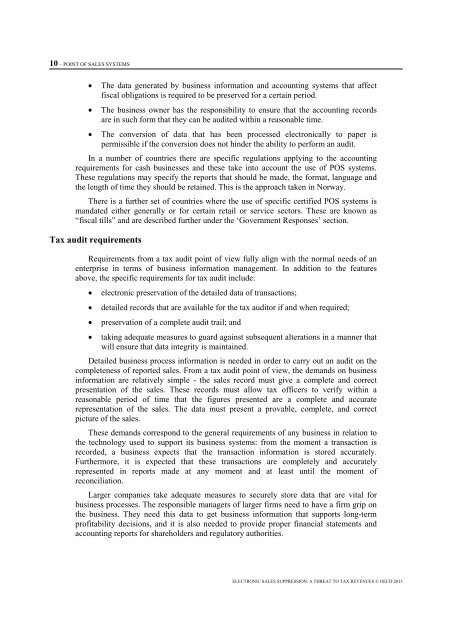ELECTRONIC SALES SUPPRESSION: A THREAT TO TAX REVENUES
ELECTRONIC SALES SUPPRESSION: A THREAT TO TAX REVENUES
ELECTRONIC SALES SUPPRESSION: A THREAT TO TAX REVENUES
Create successful ePaper yourself
Turn your PDF publications into a flip-book with our unique Google optimized e-Paper software.
10 – POINT OF <strong>SALES</strong> SYSTEMS<br />
• The data generated by business information and accounting systems that affect<br />
fiscal obligations is required to be preserved for a certain period.<br />
• The business owner has the responsibility to ensure that the accounting records<br />
are in such form that they can be audited within a reasonable time.<br />
• The conversion of data that has been processed electronically to paper is<br />
permissible if the conversion does not hinder the ability to perform an audit.<br />
In a number of countries there are specific regulations applying to the accounting<br />
requirements for cash businesses and these take into account the use of POS systems.<br />
These regulations may specify the reports that should be made, the format, language and<br />
the length of time they should be retained. This is the approach taken in Norway.<br />
There is a further set of countries where the use of specific certified POS systems is<br />
mandated either generally or for certain retail or service sectors. These are known as<br />
“fiscal tills” and are described further under the ‘Government Responses’ section.<br />
Tax audit requirements<br />
Requirements from a tax audit point of view fully align with the normal needs of an<br />
enterprise in terms of business information management. In addition to the features<br />
above, the specific requirements for tax audit include:<br />
• electronic preservation of the detailed data of transactions;<br />
• detailed records that are available for the tax auditor if and when required;<br />
• preservation of a complete audit trail; and<br />
• taking adequate measures to guard against subsequent alterations in a manner that<br />
will ensure that data integrity is maintained.<br />
Detailed business process information is needed in order to carry out an audit on the<br />
completeness of reported sales. From a tax audit point of view, the demands on business<br />
information are relatively simple - the sales record must give a complete and correct<br />
presentation of the sales. These records must allow tax officers to verify within a<br />
reasonable period of time that the figures presented are a complete and accurate<br />
representation of the sales. The data must present a provable, complete, and correct<br />
picture of the sales.<br />
These demands correspond to the general requirements of any business in relation to<br />
the technology used to support its business systems: from the moment a transaction is<br />
recorded, a business expects that the transaction information is stored accurately.<br />
Furthermore, it is expected that these transactions are completely and accurately<br />
represented in reports made at any moment and at least until the moment of<br />
reconciliation.<br />
Larger companies take adequate measures to securely store data that are vital for<br />
business processes. The responsible managers of larger firms need to have a firm grip on<br />
the business. They need this data to get business information that supports long-term<br />
profitability decisions, and it is also needed to provide proper financial statements and<br />
accounting reports for shareholders and regulatory authorities.<br />
<strong>ELECTRONIC</strong> <strong>SALES</strong> <strong>SUPPRESSION</strong>: A <strong>THREAT</strong> <strong>TO</strong> <strong>TAX</strong> <strong>REVENUES</strong> © OECD 2013


